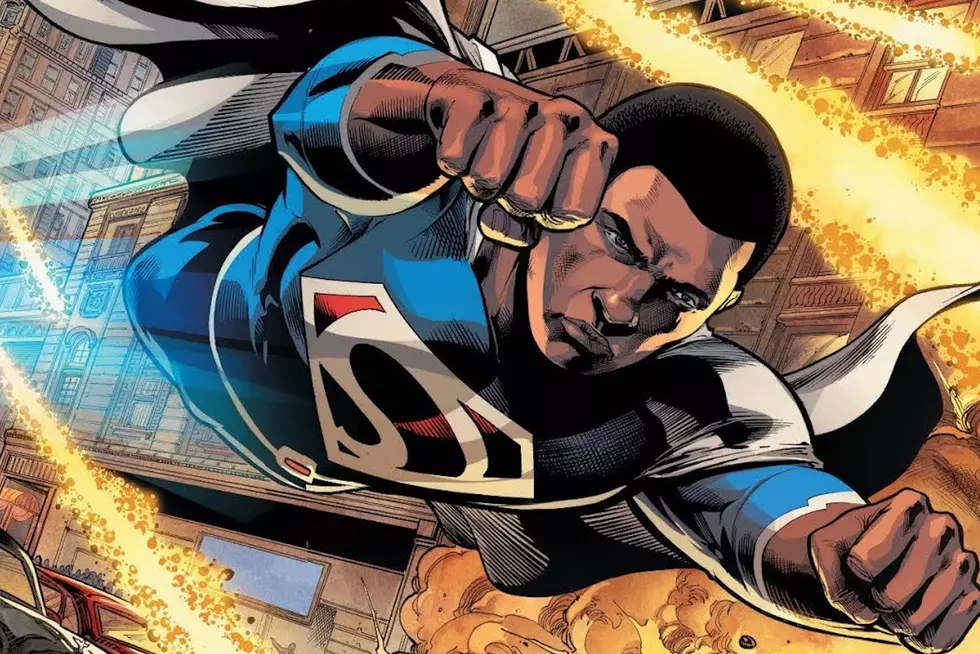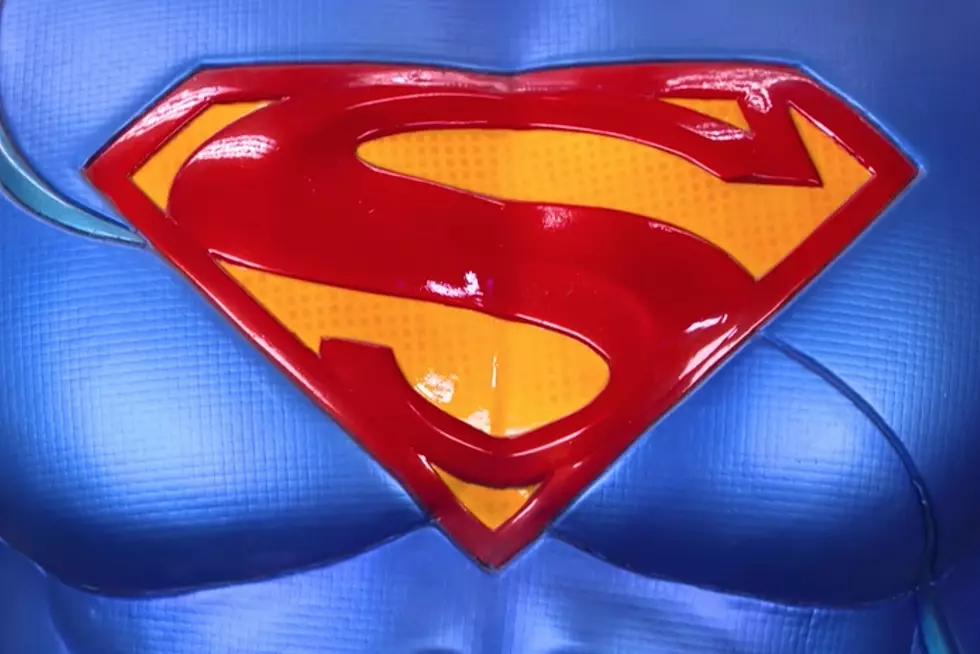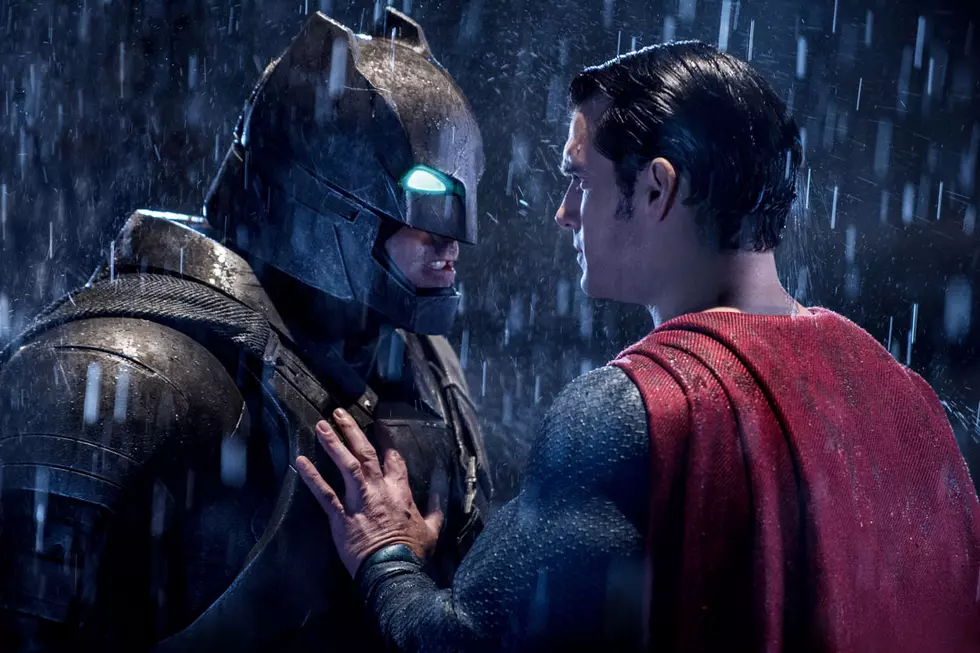
Ask Chris #251: President Lex
Q: Can you explain how Lex Luthor was elected President? Donald Trump might need some pointers. -- @ASaltzberg
A: President Lex! Now there's a story that I haven't thought about in a while - and just for context, I'm someone who thinks about Harold, the hunchbacked mechanic that Batman used to keep in his basement to fix up the Batmobile, at least once a week. Looking back, it seems like a very weird story, an ultimately forgettable new direction for a villain that never really went anywhere, but at the time, it definitely felt like it was a big deal.
Part of that, I'm sure, is because I was still a teenager caught up in the fun of reading a Superman title every week in what was, for better or worse, a pretty notable time in the character's history, but there's a little more to it than that, too. The more I think about it, the more I'm convinced that President Lex was probably the best idea to hit the Superman books for at least five years in either direction.
The thing that really makes President Lex work is context --- and not just the context of 2000 being one of the most heated election years in recent memory, although the fact that the story managed to hit in the middle of a too-close-to-call presidential race was probably one of the most fortunate bits of timing DC's ever lucked into. It's about the context of what was going on in the books at the time, and what had been going on in them over the previous 15 years.
More than any other character, the post-Crisis Superman was defined by capital-E Events. You could really say that about a lot of characters in the '90s --- Batman certainly bounced around in his share from Knightfall to No Man's Land, and at Marvel, characters like Spider-Man and the X-Men seemed to be in a perpetual state of crossovers for the entire decade --- but with Superman, it was the defining characteristic of the entire franchise, where the stream of big events was so constant that they became routine.
It wasn't that there were only stories geared around the Events. In all honesty, this might just be me looking back on teenage years where I read a whole lot of Wizard magazines, but the Superman titles of the '90s seemed like they were entirely built around getting to the next world-shaking event. And it makes sense, too.
The post-Crisis Superman does, after all, descend directly from, well, Crisis. It's the biggest event in DC history --- in superhero history across the board, really --- and while there would eventually be new origins and new characters across the entire universe, the biggest change that came directly out of that book was to Superman himself. Just look at the comics: In January of 1987, you could head to the newsstand and buy Superman #1, and that's something people hadn't been able to do since 1940.
Maybe it's because he was born out of that huge event, or maybe it's just that the creators behind the books were attempting to recapture the feel of the Silver Age, where every issue of Superman and Action Comics were bizarre events unto themselves, but it eventually became the pattern that the book would fall into for the entire decade.
That's not to say that the people who were actually working on those books weren't doing their best to try to build up Superman as a character and the world around him. Roger Stern, for example, worked on a lot of the stuff in that era, and he might be the most underrated writer in superhero comics, and say what you will about Dan Jurgens, but he was the primary architect of one of the decade's best-selling DC stories.
Both of those creators did a pretty solid job of making everything work together with what had been set down in the reboot, and when you get to the second-tier Superman Family creators like Louise Simonson, John Bogdanove, Karl Kesel, and Tom Grummett, there's a whole lot of really strong stuff there. But still, it often feels like it's orbiting the next big event rather than being allowed to build organically.
It's an approach that was really cemented in 1994 with The Death of Superman, which was released to truly massive commercial success, but even before that, the idea was there, going all the way back to John Byrne and the "Supergirl Saga," and the bearded exile into space. And after? You've got the wedding, the Fall of Metropolis, the Death of Clark Kent, the electric blue era, the Millennium Giants --- and that's on top of the books that tied into the regular line-wide events that DC was putting out, like Final Night and DC One MIllion.
Even the run that would eventually bring us President Lex was treated as an event unto itself, a soft relaunch of all four monthly titles in 1999 with all-new creative teams that was meant to mark the start of a new era. And within that, there were even more events, from Y2K to Emperor Joker, all the way through to Lex 2000. The Superman books just could not get away from those titanic, world-shaking stories.
And when you get right down to it, that's kind of the way it should be, right? I mean, he's Superman, the world's most powerful superhero. If the stories about him aren't Events, then why even bother?
The problem is, when everything's an Event, well, nothing is, and as much as this might run contrary to how superhero comics work, it's kind of hard to top a story where a guy literally dies, especially if you spend the next year on his funeral and four other dudes fighting each other to find out who the real successor is. Everything begins to feel routine, which leads you to start looking at ways to really change things up and do something different --- and to their credit, the teams on the Superman books in that era were very good at trying to tap into the zeitgeist to make that happen.
It's how you get something like Y2K, where the idea that we were going into a new millennium that felt like the future meant that Metropolis itself gets a futuristic upgrade to become a literal City Of Tomorrow, full of weird art-deco future tech and flying cars.
And it's where you get President Lex.
In a lot of ways, it's a story that makes perfect sense. I wrote about this not too long ago, but for Luthor, the '86 reboot was all about recontextualizing him to give him all the kinds of power that Superman didn't have. Superman's a kind-hearted farmboy from a town so small that its name is "Smallville," Luthor's the ruthless businessman from a city so overwhelming that its name is "Metropolis." Superman has all the physical strength in the world, but Luthor has an entirely different kind of strength, the kind that comes from money and a lack of any conscience to keep you from using it to control everything around you.
But there's another aspect of that reboot, too, which is that Superman had been significantly depowered under Byrne --- the indestructible costume was gone, for one thing, and this was a Superman who could get cuts and bruises and bleed, which is how he got punched to death by a bone monster in the first place.
The thing is, the years following that had been marked by the pendulum swinging back in the other direction, with Superman getting steadily more powerful on the page, something that's bound to happen when you, you know, come back from the dead. It might seem like a silly distinction, and it is when you consider that fictional protagonists all have the same super-power of Winning At The End, but there are a lot of stories from that era that are all about Superman "finally cutting loose" and "not holding back anymore!" That one where he punches Darkseid in the face so hard that Darkseid gets two black eyes that swell shut so he can't shoot out Omega Beams anymore is probably the most egregious example, but it's certainly not the only one.
Clearly, the people in charge wanted a more powerful Superman, and if you're going to have a more powerful Superman, then you naturally need a more powerful Lex. And if Lex is already as powerful as you can be in the private sector, then it's time to join up with the government.
It even makes sense from an in-universe standpoint, because while we as readers know that Lex Luthor is a bad guy who used to fly around in a green and purple battlesuit shooting Kryptonite rays, the people in the DC Universe just think he's another rich guy. That's one of the key elements of the reboot; that Lex had the appearance of propriety, and that the crimes he so obviously committed in his campaign against Superman could never be made to stick. So why not take advantage of that by having him do something that the previous universe's Master Criminal Lex could never do?
Unfortunately, there's a whole lot of ways where it doesn't make any damn sense, too, and chief among them is that in order to make it work, you have to make Superman look like a gigantic idiot.
In order for the story to really work, Lex actually has to win the presidency. That's the hook; that the most powerful person on the planet's greatest enemy is the Leader of the Free World™, and to be honest, it's got a lot of punch as a surprise ending. Reading those books at the time, I certainly didn't expect Luthor to actually take power, but there it is.
The problem, though, is that for that to happen, Superman has to not stop it from happening.
The storytelling gymnastics they do to accomplish this are mostly built around the idea of Superman Respecting The American Public and Believing People Will Do The Right Thing, and while that's a decent idea in theory, there are a couple of holes in that plot big enough to sail a battleship through. The idea comes up in a story published after the election --- a Christmas issue, actually --- where Superman goes and talks to the rest of the Justice League about what he should do about President Lex:
On the one hand, the idea that one political candidate is just the same as another and that we're all deluding ourselves into thinking things can change is a pretty common idea among the disaffected electorate, especially coming out of the '90s. On the other hand, Lex Luthor is an actual supervillain. This story came out like two years after "Rock of Ages," a story where Lex reforms the Injustice Gang and uses an invisible skull-shaped space station to murder hundreds of people with hard-light holograms. Admittedly, all those people were later wished back to life by the Joker (long story), but still. You were there for that, Kyle, even if you were trapped in an alternate future for most of it! "Crook" is kind of underselling things a little.
Even adjusting for superhero comics, where President Darkseid is a pretty legit possibility, saying that the next guy might be just as bad as Lex Luthor is stretching things quite a bit. No matter what side of the political spectrum you're on, I think we can all come together and agree that most if not all of our previous presidents have never built invisible skull-shaped death satellites as part of an effort to kill Superman.
Not that they wouldn't, you understand. Just that they haven't.
So while it's certainly in character for Superman to believe the best in us, The American People can only really make the right choice if they know what the right choice is. It's why we have things like debates, so you can see what the candidates think about things. And, you know, if there's a skull-shaped death satellite where the Joker and Mirror Master tried to do a bunch of murders, that should probably come up. And you know who's supposed to tell us about that stuff? Reporters.
It is literally Superman's day job to let us know stuff like this.
But he doesn't, because from a storytelling standpoint, he can't. If Superman, the omnipotent but friendly space alien who saves the world at least four times a month (five if there's an extra Wednesday), comes on TV and says "Hey, Lex Luthor is a straight up supervillain who once blew up Metropolis and then blamed it on a clone, y'all should probably not put him in charge of America," then logic dictates that people are probably going to listen. Even if it won't hold up in court, what's Lex gonna do if Superman foils his plans? Devote the rest of his life to trying to kill him with increasingly complicated schemes?
Instead, his reluctance to sway public opinion is couched as one of those "Must There Be a Superman?" moments where he tries not to let his presence determine the course of human development, which is really the only thing you can do if you want to tell that story.
But it doesn't ring true, because instead of it showing Superman letting us Find Our Own Way, it comes off as Superman hiding the truth from people who really deserve to know it. It's the superheroic equivalent of letting someone walk out into traffic because they didn't see a car was coming. Except that in this case, the car is a sneering billionaire with a warehouse full of battle suits that run on radioactive space rocks.
See? Kyle's right there.
Anyway, with all that said, I still maintain that it's a good idea at heart, and supervillains are elastic enough as characters that you could've forgiven a lot of what they did to get him in office if they'd actually done something while he was there. In the end, though, it was kind of a whole bunch of nothing.
Part of that comes from the same endless grinding of the Event gears that got him in there in the first place: Luthor had barely been sworn in when "Return to Krypton" happened, and once we were through that, it was time for Our Worlds At War, a line-wide crossover that might actually be DC's least remembered event. And it was that story, only about a year later, that provided the seeds for Luthor to eventually be impeached, although it wouldn't actually happen until the first arc of Superman/Batman saw Luthor return to the green-and-purple battlesuit and supervillain his way right out of the White House.
Incidentally, if you go look at Wikipedia, the official reason for Luthor being impeached is listed as "abuse of the super-steroid Venom," which, while not quite as illegal as attempted murder via skull-shaped space station, is still a pretty hilarious thing to imagine happening to the President of the United States.
In the end, the problem with President Lex wasn't that it happened, but that there wasn't a whole lot done with it. Lex Luthor, Boss of America, should have been a huge line-wide deal, but the only thing we really got out of it was a very good two-part crossover between Loeb and McGuinness's Superman and Rucka and Turnbull's Detective Comics about Lois and Batman teaming up to steal Luthor's Kryptonite ring from the White House. That's pretty much it. Despite Lex's promise to make the entire Justice League's lives hell, the only thing he really accomplished was framing Bruce Wayne for murder.
And really, that might've been a matter of timing. As lucky as DC was to get the election story going in a race marked by an even split between candidates and an electorate that seemed prime for an alternative (even one as shady as Luthor), there were, for obvious reasons, very few people who were really into reading stories about superheroes fighting the American government by the end of 2001.
Still, I honestly think it's a pretty good idea, and one that might have actually been a few years ahead of its time.
Ask Chris art by Erica Henderson. If you’ve got a question you’d like to see Chris tackle in a future column, just send it to @theisb on Twitter with the hashtag #AskChris.
Check Out Some Strange and Surprising DC Comics Facts
More From ComicsAlliance









